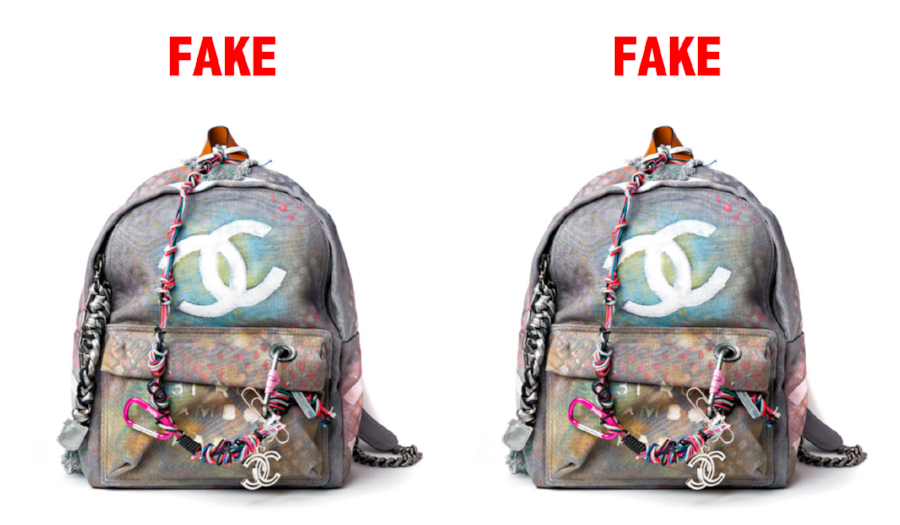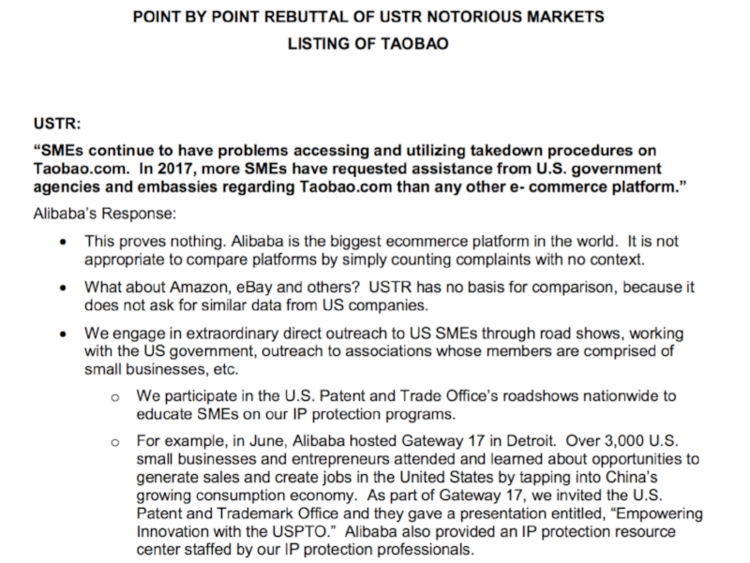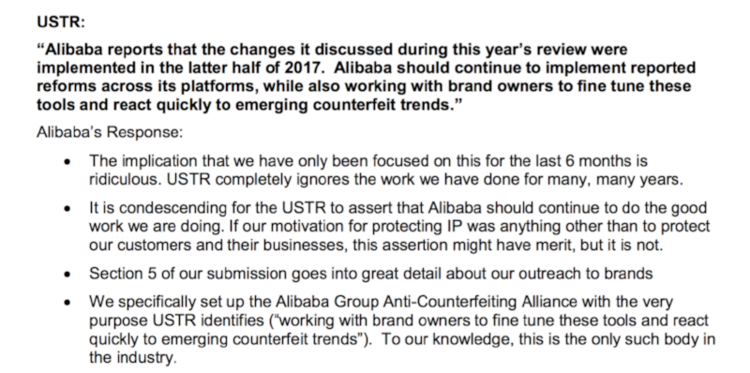
The Office of the United States Trade Representative (“USTR”) has released its 2017 Out-of-Cycle Review of “Notorious Markets,” and the annual black list is causing a clash with China’s largest e-commerce company … again. The review details which entities – both physical and online entities – are most egregiously abusing the intellectual property rights of American companies on a worldwide basis, and Alibaba has landed on the list.
This annual report is the result of a review of the state of intellectual property rights protection and enforcement around world, and it is especially relevant in the retail market, as it specifies sellers, nearly all of which are consumer-facing, that raise concerns due to their intellectual property practices.
In its 2017 review, which was released this week, the USTR reveals that a number of the usual suspects that have been included on the list in the past for piracy, counterfeiting, ineffective systems for protecting against unfair commercial use of U.S. IP rights, etc., are front and center in the latest edition, as well. One key inclusion: Alibaba’s TaoBao.
Alibaba … Again
The Jack Ma-owned e-commerce giant’s TaoBao platform was highlighted again this year, after being reintroduced to the list in 2016, following a four year absence. In much the same vein as last year’s report, the USTR identified that “Alibaba has undertaken efforts, some within the last six months, to curb the offer and sale of infringing products on Taobao.com, and some right holders report an improved outlook as a result.”
However, the report, which was produced under the watch of USTR head Robert E. Lighthizer, further states, “At the same time, the prevalence of infringing listings and sales continues to be a challenge and there are additional steps Alibaba must take to address ongoing concerns.”
What are those concerns? Well, according the USTR, “Alibaba has not identified metrics to assess objectively the scale of infringing products sold on Taobao.com nor objectively demonstrated that the volume or prevalence of counterfeit goods has decreased over the last year. The data provided by Alibaba to date do not directly reflect the scope and status of the counterfeiting problem on the Taobao.com platform, but instead is merely suggestive of progress made. ”
In short: “A high volume of infringing products reportedly continue to be offered for sale and sold on Taobao.com and stakeholders continue to report challenges and burdens associated with IP enforcement on the platform.”
While inclusion on the USTR’s list does not carry any direct penalties, it is a blow to Alibaba’s efforts – including partnerships with brands (and luxury conglomerates) aimed at fighting fakes and a couple of counterfeit-centric lawsuits – to shed perceptions its websites are riddled with fakes, which is a key to gaining a bigger international customer base and taking market share from global competitors, such as eBay and Amazon.com.
A “Scapegoat”
According to a statement from Alibaba on Friday: “As a result of the rise of trade protectionism, Alibaba has been turned into a scapegoat by the USTR to win points in a highly-politicized environment and their actions should be recognized for what they are. The USTR’s actions made it clear that the Notorious Markets List, which only targets non-US marketplaces, is not about intellectual property protection, but just another instrument to achieve the US Government’s geopolitical objectives.”
The statement continues on to note, “Alibaba reiterates our point of view: we will continue to strengthen our IP protection system with world leading technology and a collaborative approach with brands and other stakeholders. Our efforts and results speak for themselves: over 100,000 brands, including 75 percent of the world’s most valuable consumer brands, do business on our platform.”
UPDATED (Jan. 12, 2018, 5:30pm): Alibaba Group has since released an 11-page point-by-point to the media in response to the USTR’s Notorious Markets report, in which it calls the USTR’s findings “condescending,” “ridiculous,” and “patently absurd.”
Alibaba asserts that it is “unaware of any platform that provides the volume and quality of information we provide to law enforcement authorities. Nobody comes close,” despite the USTR’s claims to the contrary. It goes on to state that “if USTR has a concern with the Chinese government, then it should raise the concern directly with the Chinese government. They should not use Alibaba as a pawn in their bilateral disputes.”
Still yet, Alibaba states, “This year’s report completely ignores the fact that Alibaba met and exceeded the 2016 report’s recommendations. And, in a classic move-the-goalposts manner, recommends Alibaba take action in seven new areas, where Alibaba already has substantial accomplishments.In choosing this course of action, the USTR hurts their credibility and shows they are not running a fair or fact-based process. This also sends a terrible message to other ecommerce operators who may want to get more aggressive in protecting IP that there is virtually no benefit in working with the USTR in good faith, as we have clearly done.”
A few of the entries read as follows …


UPDATED (Jan. 18, 2018): A spokesman for China’s Ministry of Commerce has slammed the merit of the USTR’s report. Gao Feng, a spokesman of China’s commerce ministry, said on Thursday that the report “lacks solid evidence” and said that the Chinese government “always attaches great importance to intellectual property protection.”










